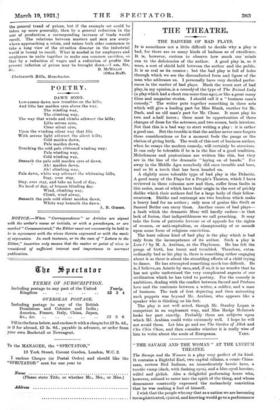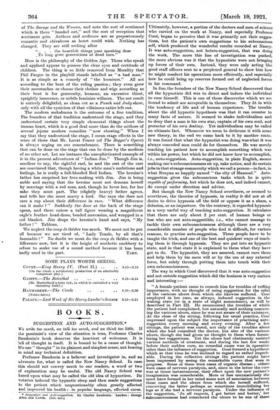"1:l31, SAVAGE AND THE WOMAN " AT THE LYCEUM TBLEATRE.
The Savage and the Woman is a play very perfect of its kind. It contains a Rightful Earl, two capital villains, a comic China- man, serious Red Indians, an immoderately heroin hero, a terrific vamp (dark, with flashing eyes), and a blue-eyed heroine, wilful and girlish. Also a delightful performing horse who, however, refused to enter into the spirit of the thing, and whose demeanour constantly expressed the melancholy conviction that he was making a fool of himself.
I wish that the people who say that as a nation we are becoming too sophisticated, cynical, and knowing would go to a performance
of The Savage and the Woman, and note the sort of sentiment which is there " handed out," and the sort of reception that sentiment gets. Authors and audience are as preposterously romantic and chivalrous as heart could wish. Nothing has changed. They are still seeking after
.d . . the heartfelt things past speaking dear To long gone generations of dead men."
Here is the philosophy of the Golden Age. Those who speak and applaud appear to possess the clear eyes and certitude of children. The thing is so little removed from Morality that Phil Fargoe in the playbill stands labelled as " a bad man." It is as simple as a comedy of " the humours." All act according to the bent of the ruling passion ; they even grow their moustaches or choose their clothes and wigs according as their bent is for generosity, humour, an excessive thirst, sprightly innocence, or subtle feminine wiliness. The net result is entirely delightful, as clean cut as "a Punch and Judy show, only with all the cynicism of that villainous satire left out.
The modern melodrama is the outcome of a fine tradition. The founders of that tradition understood the stage, and they anderstood certain very simple elemental things about the human heart, which is a good deal more than do the authors of several jejune modern comedies " now showing." When I say that they understood the stage, I mean stage effects in the sense of those that Mr. Lovat Fraser (of The Beggar's Opera) is always urging on our remembrance. There is something that can be done on the stage that can be done by the medium of no other art. Let me instance the unsophisticated example of it in the present adventures of " Indian Jim." Though Jim is, needless to say, the rightful earl, he and the rest of the cast are convinced that, though having a white man's ambitions and feelings, he is really a full-blooded Red Indian. The heroine's father has surprised her love-making with Jim. Jim is being noble and saying that the heroine must not demean herself by marriage with a red man, and, though he loves her, for her sake they must part. The (slightly heavy) father agrees, and tells her she must marry a lord. She says she does not care a rap about their difference in race. " What difference can it make ? " Suddenly the door at the back of the stage opens, and there enters a tall figure wearing a magnificent eagle's feather head-dress, beaded moccasins, and wrapped in a red blanket. Jim drops the heroine's hand and says, " My father ! " Tableau.
We neglect the coup de thicitre too much. We must not be put off because we are tired of, " Lady Teazle, by all that's iamnable ! " No doubt we must do the coup de theatre with a iifference now, but it is the height of aesthetic snobbery to refuse to make use of a sound method because it has been



































 Previous page
Previous page